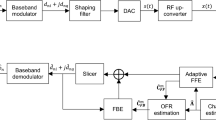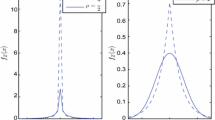Abstract
This paper applies the Bayesian conditional decision feedback estimator (BCDFE) to rapidly fading frequency selective channels. The BCDFE is a model-based deconvolution algorithm which jointly estimates the transmitted data and channel parameters. The BCDFE smoothly transitions between trained and blind operation and consequently provides robust performance in rapidly fading channels. We provide a brief derivation of the BCDFE and characterize the performance on the land mobile radio channel. We assess the BCDFE's principle design characteristics and the resulting performance in both transient and steady-state operation. The effects of delay spread, Doppler spread, and cochannel interference on the bit error probability performance are also presented. The BCDFE demonstrates many of the desirable characteristics of an equalizer for mobile radio.
Similar content being viewed by others
References
W. C. Y. Lee,Mobile Communications Engineering, McGraw-Hill, New York, 1982.
J. G. Proakis,Digital Communications, McGraw-Hill, New York, 1989.
J. G. Proakis, Adaptive equalization for TDMA digital mobile radio,IEEE Transactions on Vehicular Technology, Vol. VT-40, pp. 333–341, 1991.
G. D. Forney, Maximum likelihood sequence estimation of digital sequences in the presence of intersymbol interference,IEEE Transactions on Information Theory, Vol. IT-18, pp. 363–378, 1972.
K. Abend and B. D. Fritchman, Statistical detection for communication channels with intersymbol interference,Proceedings of the IEEE, vol. 58, pp. 779–785, 1970.
H. Yoshino, K. Fukawa, and H. Suzuki, Adaptive equalization with RLSE-MLSE for fast fading mobile radio channels,IEEE International Symposium on Circuits and Systems, San Diego, CA, pp. 501–504, 1992.
G. D'Aria, R. Piermarini, and V. Zingarelli, Fast adaptive equalizers for narrow-band TDMA mobile radio,IEEE Transactions on Vehicular Technology, Vol. VT-40, pp. 392–404, 1991.
P. K. Shukla and L. F. Turner, Examination of an adaptive DFE and MLSE/near-MLSE for fading multipath radio channels,IEE Proceedings-I, Vol. 139, pp. 418–428, 1992.
J. D. Lin, F. Ling, and J. G. Proakis, Joint data and channel estimation for TDMA mobile channels,Proceedings of IEEE International Symposium on Personal, Indoor and Mobile Radio Communications, Boston, MA, pp. 235–239, 1992.
J. Karaoguz and S. H. Ardalan, A soft decision-directed blind equalization algorithm applied to equalization of mobile communication channels,Proceedings of IEEE International Conference on Communications, Chicago, IL, pp. 1272–1276, 1992.
K. Giridhar, J. J. Shynk, and R. A. Iltis, Bayesian/decision-feedback algorithm for blind equalization,Optical Engineering, Vol. 31, pp. 1211–1223, 1992.
G. K. Lee, S. B. Gelfand, and M. P. Fitz, Bayesian decision feedback techniques for deconvolution,IEEE Journal on Selected Areas in Communications, Vol. SAC-13, January 1995, pp. 155–166.
K. Giridhar, J. J. Shynk, and R. A. Iltis, Fast dual-mode adaptive algorithms for equalization and timing recovery of TDMA mobile radio signals,IEEE Conference on Signals, Systems & Computers, Asilomar, pp. 339–345, 1992.
P. R. Kumar and P. Varaiya,Stochastic Systems: Estimation, Identification, and Adaptive Control, Prentice-Hall, Englewood Cliffs, NJ, 1986.
G. K. Lee, S. B. Gelfand, and M. P. Fitz, Bayesian techniques for deconvolution, Technical Report, School of Electrical Engineering, Purdue University, West Lafayette, IN, 1993.
W. C. Jakes,Microwave Mobile Communications, Wiley, New York, 1974.
M. L. Moher and J. H. Lodge, TCMP—a modulation and coding scheme for Rician fading channels,IEEE Journal on Selected Areas in Communications, vol. SAC-7, December 1989, pp. 1347–1355.
A. Aghamohammadi and H. Meyr, A new method for phase synchronization and automatic gain control for linearly modulated signals on frequency flat fading channels,IEEE Transactions on Communications, Vol. COM-38, pp. 25–29, 1991.
P. Ho, J. Cavers, and J. Varaldi, The effect of constellation density on trellis coded modulation in fading channels,IEEE Transactions on Vehicular Technology, Vol. VT-42, pp. 318–325, 1993.
Author information
Authors and Affiliations
Rights and permissions
About this article
Cite this article
Lee, Gk., Fitz, M.P. & Gelfand, S.B. Bayesian techniques for equalization of rapidly fading frequency selective channels. Int J Wireless Inf Networks 2, 41–54 (1995). https://doi.org/10.1007/BF01464197
Issue Date:
DOI: https://doi.org/10.1007/BF01464197




